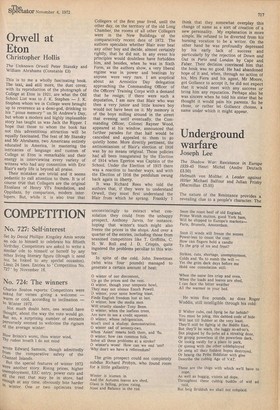Orwell at Eton
Christopher Hollis
The Unknown Orwell Peter Stansky and William Abrahams (Constable £3)
This is to me a wholly fascinating book. The text, and still more, the dust cover. with its reproduction of the photograph of College at Eton in 1921, are what the Old School List was to J. K. Stephen — J. K. Stephen whom we in College were brought up to reverence as a demi-god, drinking to his "pious memory" on St Andrew's Day, but whom a modern and highly implausible story has taught us was Jack the Ripper. I hope that those to whom the book has not this adventitious attraction will be equally fascinated. The feat of Mr Stansky and Mr Abrahams, two Americans entirely educated in America, in mastering the intricacies of language and custom of College at Eton is remarkable and their energy in interviewing every variety of witness who had any connection with Eric Blair's early life is beyond all praise.
Their mistakes are trivial and it seems pedantic to call attention to them. It is of course true that Collegers are the original Etonians of Henry VI's foundation, and Oppidans, by comparison, modern interlopers. But, while it is also true that Collegers of the first year lived, until the other day, on the territory of the old Long Chamber, the rooms of all other Collegers were in the New Buildings of the comparatively recent date of 1872. The authors speculate whether Blair ever beat any other boy and decide, almost certainly rightly, that he did not. In any event his principles would doubtless have forbidden him, and besides, when he was in Sixth Form, as the authors show, a very liberal regime was in power and beatings by anyone were very rare. I am sceptical about an Armistice Day delegation approaching the Commanding Officer of the Officers' Training Corps with a demand that he resign; if there were such a deputation, I am sure that Blair who was then a very junior and little known boy would not have been on it. My memory is of the boys milling around in the street that evening until eventually, the Commanding Officer, Colonel Rayner Wood, appeared at his window, announced that further parades for that half would be cancelled and appealed to them to go quietly home. More directly pertinent, the antinomianism of Blair's election of 1916 was by no means original. Those policies had all been inaugurated by the Election of 1914 when Egerton was Captain of the School. Under the Election of 1915 there was a reaction to harsher ways, and with the Election of 1916 the pendulum swung back again to liberty.
It was Richard Rees who told the authors that, if they were to understand Orwell, they must first understand the Blair from which he sprang. Frankly I think that they somewhat overplay this change of name as a sort of creation of a new personality. My explanation is more simple. He refused to be diverted from his burning vocation to be a writer. On the other hand he was profoundly depressed by his early lack of success and particularly by the rejection of Down and Out in Paris and London by Cape and Faber. Their decision convinced him that the book was no good. He had abandoned hope of it and, when, through no action of his, Mrs Fiera and his agent, Mr Moore, got Gollancz to accept it, he did not expect that it would meet with any success or bring him any reputation. Perhaps also he was sincere when he told his sister that he thought it would pain his parents. So he chose, or rather let Gollancz choose, a name under which it might appear.








































 Previous page
Previous page